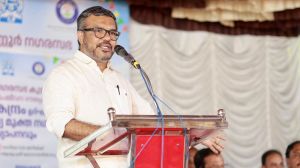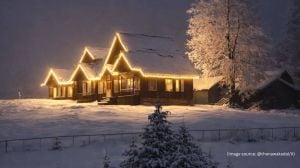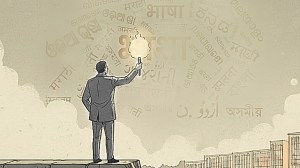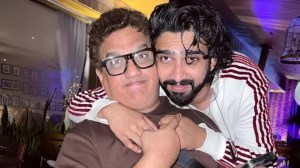Waqf Bill debate: Lok Sabha has rarely sat longer. Here are five such times
Discussion on 50 years of Independence in 1997 for over 20 hours, and on the Gujarat violence of 2002, for over 16 hours, figure among the longest
 The House started at 11 am Wednesday and finished around 2.40 am on Thursday, having dedicated over 12 hours to just the Waqf Bill. (ANI Photo/Sansad TV)
The House started at 11 am Wednesday and finished around 2.40 am on Thursday, having dedicated over 12 hours to just the Waqf Bill. (ANI Photo/Sansad TV)THE DISCUSSION over the Waqf (Amendment) Bill saw the Lok Sabha sit for one of its longest days: 15 hours 41 mins. This included the Question Hour and a discussion on the President’s Rule in Manipur.
The House started at 11 am Wednesday and finished around 2.40 am on Thursday, having dedicated over 12 hours to just the Waqf Bill.
The Rajya Sabha went on to discuss the Waqf Bill for over 12 hours, starting at 1 in the afternoon on Thursday. This was the second-longest Rajya Sabha sitting as per parliamentary records, notes PTI. The longest-ever sitting of the Rajya Sabha was on September 17, 1981, when the House sat till 4.43 am the next day for the consideration and passage of the Essential Services Maintenance Bill, 1981. Then, on May 8, 1986, the House sat till 1:52 am the next day for the consideration and passage of the Muslim Women (Protection of Rights on Divorce) Bill, 1986.
Data compiled by PRS Legislative Research shows that the Lok Sabha has rarely sat longer, with some of the times being during a Session to mark 50 years of Independence, to discuss the violence in Gujarat in 2002, to talk about the Essential Services Maintenance Bill, and twice to discuss the Railway Budget.
1997: Special sitting on 50 years of Independence
Sitting starts 11:08 am, August 30; ends 8:24 am, August 31
Total duration: 20 hours, 8 min (including adjournments in between)
This sitting was part of a special Session to celebrate 50 years of Indian Independence. I K Gujral headed a 13-party United Front government at the time.
This was the first time that a special Session of the House was convened to deliberate exclusively on a single motion, which was introduced by Atal Bihari Vajpayee, then the Leader of Opposition in the Lok Sabha, on “the state of democracy and democratic institutions, economic situation, position of infrastructure, achievements and potential in the field of science and technology and the state of human development in the country”.
The House spent 64 hours and 29 minutes discussing the motion in total.
A chunk of Vajpayee’s speech revolved around “the criminalisation of politics”. He also touched upon increasing election expenses, asking: “Can we contest and win elections without black money? Perhaps only a few people will come under this category.”
The BJP leader suggested a corpus amount in the Budget that could be utilised by parties for election purposes.
As the floor opened up for discussion, MPs discussed a wide range of topics – women’s education, rural development, disarmament, caste, economy, agriculture and foreign policy, among others.
1993: Railway Budget
Sitting starts 11:01 am, March 30; ends 6:25 am, March 31
Total hours: 18 hours, 25 minutes (including adjournments in between)
K C Lenka, a Rajya Sabha MP, was the Railway Minister then under the Congress-led minority government of PV Narasimha Rao. The sitting dragged on as the Lok Sabha discussed a range of amendments.
1998: Railway Budget
Sitting starts 11:00 am, June 8; ends 6:04 am June 9
Total: 18 hours, 4 minutes (including adjournments in between)
Nitish Kumar, the JD(U) supremo, was the Railways Minister then under the Atal Behari Vajpayee-led NDA coalition government. In this case too, a range of amendments and provisions in the Budget were discussed and debated, leading to the extensive sitting.
2002: Post-Godhra riots
Sitting starts 11:00 am, April 30; ends 4:25 am, May 1
Total:17 hours, 25 minutes (including adjournments in between)
Under the Vajpayee government at the Centre, the Lok Sabha debated a motion “expressing grave concern over the failure of the administration in ensuring security of the minority community in various parts of the country, specially in Gujarat” after the riots in the state in 2002.
Initiating the discussion, the late Samajwadi Party leader and then Sambhal MP Mulayam Singh Yadav said the House “requests the government to restore confidence (among) the minority communities and to take steps to provide protection to them”.
Yadav argued that the Union government was “also responsible for the atrocities committed against these communities” in Gujarat. “It is true that 10%-15% of those who suffered were Hindus, but they included 80%-85% Muslims, with burning of their shops and factories, raping of women, raping of girls on roads… Gujarat is burning… Does this not prove the incompetence of the Union government? Is the government not responsible for this?”
Speaking after Yadav, the BJP’s Uma Bharti who represented the Bhopal Lok Sabha seat said she had accompanied PM Vajpayee to Gujarat after the riots and that he was “perturbed over the state of affairs prevailing in Gujarat and had stated that he felt ashamed… and not able to face the world”.
At the same time, Bharti raised the deaths in the Godhra train burning, and said: “The brutal killings of innocent Hindus are not condemned in plain and straight terms, but qualified with all sorts of ifs and buts… Therefore the Hindu in this country is compelled to feel that his or her killing will not be condemned unequivocally.”
When she resumed later – after the commotion over her Godhra remarks had died down – Bharti spoke about then Gujarat Chief Minister Narendra Modi attempting to “bring normalcy” in the state.
Sonia Gandhi, who was the Rae Bareli MP at the time and the Congress president, pointed out that there was “only one FIR lodged in all of Gujarat on a complaint of rape…”.
Speaking on behalf of the Jammu and Kashmir National Conference, which was part of the NDA then, Omar Abdullah, the Srinagar MP, said the minorities in the country hoped for an answer and assurance that incidents like Godhra and Gujarat do not take place again.
“Nobody in his right mind can justify what happened in Godhra, the killings of those innocent people being burnt to death in the train. No religion and no individual can justify it. But, then to seek to justify the deaths of –
even if you go by the official figures – more than 800 people in riots after riots because of what happened in Godhra is equally reprehensible,” Omar said.
L K Advani, the Union Home Minister, said the NDA government’s “track record” on curtailing communal violence was good, adding that what had happened in Gujarat was a “matter of regret”.
On the demands of various members in the House that Modi resign as CM, Advani said it “is not the solution of the problem”. “We want to solve the problem, that can happen only at the security level, by taking stern action against each criminal – be it Hindu or Muslim,” he said.
Vajpayee said that “there is an allegation that I criticise Islamic fundamentalism, but not Hindu fundamentalism”. “… I have always taken such steps at testing times (so) that the country should move on a liberal path, a path of harmony. This is the message of Indian culture. Today these allegations are being levelled to tarnish my image,” he said.
When the debate ended at 4.25 am, Mulayam Yadav said he was “expecting” the PM and Home Minister to speak more on the issue.
The motion was rejected, with 182 voting in favour and 276 against it.
1981: Essential Services Maintenance Bill
Sitting starts 11:00 am, September 15; ends 3:58 am, September 16
Total: 16 hours, 58 min (including adjournments in between)
This was under a triumphant Indira Gandhi, who had returned to power after the Janata Party that came together against her during the Emergency disintegrated. The Essential Services Maintenance Act, gave the Centre the power to prohibit strikes in certain occupations “if the Central Government is satisfied that, in the public interest, it is necessary or expedient to do so”. The Act said the government could implement the Act “by general or special order”.
Any person “who commences a strike which is illegal under this Act” or “takes part in any such strike” or who “instigates or incites” a strike shall be “liable to disciplinary action”, the Act said.
An Indian Express report from the time described the voting on the Bill — before it became an Act — as “marathon”, as “the Opposition fought the measure all the way”.
“Earlier, the House gave its consent to take up the Bill for consideration after a 14-day resistance spread over three days. Before moving to the second stage, the House rejected by 216 votes to 69 a statutory resolution seeking disapproval of the ordinance which the Bill seeks to replace. With amendments exceeding 500, the Opposition forced the House to divide repeatedly for one hour just to decide, whether or not to take up the consideration of the clauses. The Opposition lost its battle after 40 minutes to stall the extension of the strike ban coverage to a wide spectrum of private and public sector industries. Home Minister Giani Zail Singh made light of the Opposition amendments saying they were ‘reasonable but not acceptable’, the report said.
- 01
- 02
- 03
- 04
- 05































